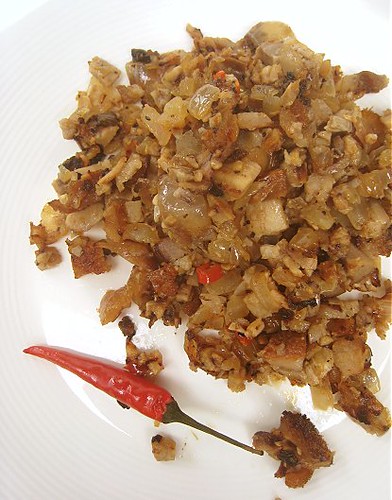
TS:
Sizzling Pig Face! Aren't you excited?!
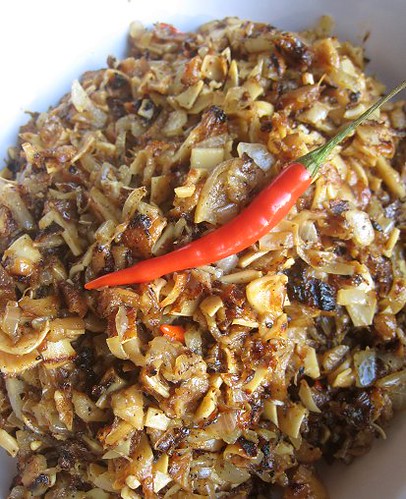
TS:
Sisig is a dish made from parts from the pig's head -- ears, cheeks, jowls -- that are cooked not once, not twice, but three times(!), flavored with calamansi and/or vinegar, and served sizzling on a hot stone/iron plate.
http://en.wikipedia.org/wiki/Calamansi
It is best eaten, people say, when imbibing beer.
JS:
Although, personally, I've never felt the need to drink beer with sisig -- I can gobble up the stuff just fine!
Pig's Ears

TS:
One fine day, JS bought a couple of packages of pig's ear. Sisig immediately came to mind; I don't actually know too many specific dishes that call for pig's ears besides this one.
You're once... (The First Cooking)
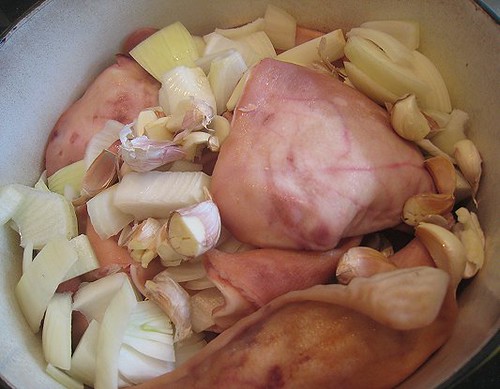
TS:
First, the ears were simmered with onions and garlic in water splashed with a little vinegar. And salt to taste, of course.
The recipe I've included at the end of the post is from Kulinarya: A Guidebook to Philippine Cuisine. That recipe called for adding pineapple juice to the simmering liquid as well. We didn't bother.
Well, that recipe also called for passing a deboned pig's head over an open flame to get rid of bristles. Obviously, we skipped that step as well.
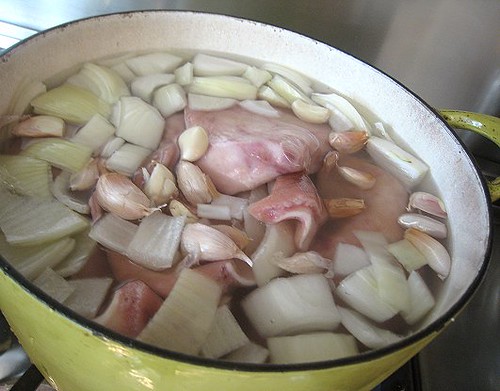
TS:
After simmering the pig's ears, we let them cool in the simmering liquid. We actually cooked them the day before.
JS:
Being the lazy pig that I am, I actually might have left the pigs ears too long to boil. The ears ended up being softer than I would have liked.
I figured we'd leave the ears overnight in the fridge to stiffen up a bit -- but they might have gone too tender on me already.
TS:
The next day, whoa! Let me tell you, those ears produced a lot of gelatin!
Twice... (The Second Cooking)
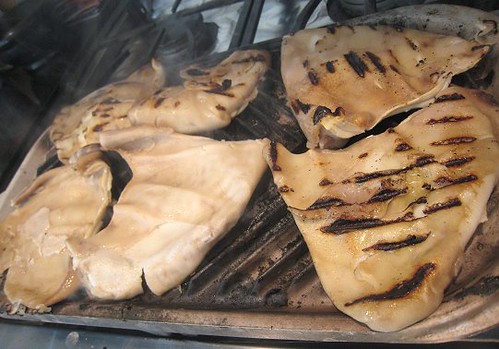
TS:
Of course, the best way to grill these would be over charcoal. We had to settle for a grill pan over the stovetop.

TS:
Hmm, I think I may have overdone the char. But, we'll get to that later.

TS:
The pig's ears were then chopped into tiny pieces.
Three times a pig's head... (The Third Cooking)
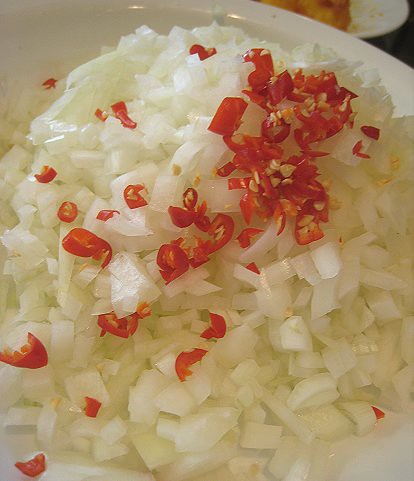
JS:
Third time's the charm: when sisig becomes sisig.
Usually, sisig would be served on hot grill plates, sizzling still when it comes to the table. We debated whether we should get one for this post, but decided against it, with the help of inertia, given that it would just be another thing cluttering up the kitchen.
TS:
Before any sizzling action can commence, I chopped onions and chilies into small pieces.
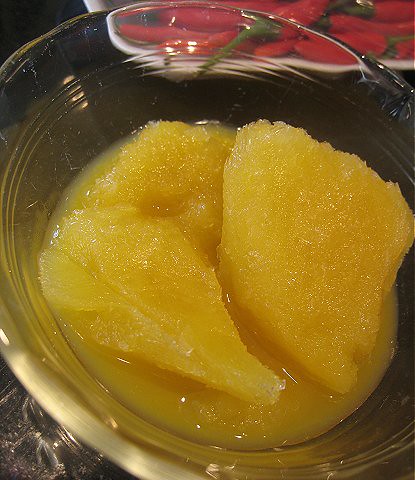
calamansi juice
TS:
We had some calamansi juice that we froze from months before.
JS:
Once the calamansi hits the wok, the game's on. There is really nothing quite like the fragrance and the flavour of calamansi.

JS:
In lieu of the sizzling plate, we settled on sorta-stir-frying it in a wok.
As is our tendency towards laziness and shortcuts, we overcrowded the wok a tad. We're really just too lazy to do stir-frying in batches -- but kids at home, please do it right.
TS:
The chopped pig's ears were "sizzled" together with the onions, calamansi juice and chilies. We also added more vinegar to intensify the acidity. Don't forget the salt! (And black pepper.)
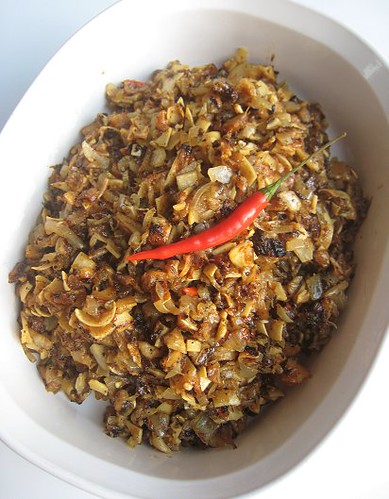
TS:
OK, now that we went through all three cooking steps, what was the verdict?
It was... meh.
So, what went wrong? Let me explain.
We only used pig's ears.
It was too ear-y for me! I really wanted a mixture of pig parts.
We overcooked the pig's ears.
They ears were left too long to simmer. They were too tender and lacked that nice cartilage-y crunch.
We over-charred the pig's ears.
The too-charred nature of the ears lent a decidedly bitter note to the dish.
The moral of the story, folks, is to prepare the dish with care.
(Well, duh!)
Pig's Head

TS:
So, another fine day, when we had a pig's head from leftover lechon, JS and I decided to give it a another try.
We already made a "starter" Paksiw na Lechon (Philippine Roast Pork simmered in Vinegar) from the rest of leftovers, and it was time to tackle the head.
Since the pig's head was already cooked, we didn't bother with cooking steps 1 and 2 (boiling and grilling, respectively). I simply chopped what meat I could salvage from the head and proceeded to step 3.
Unfortunately, the pig's ears from this head were too "cooked" and hard, thereby making them unusable.
After some faux-sizzling action with onions, chilies, calamansi juice, vinegar and salt, the dish was done.
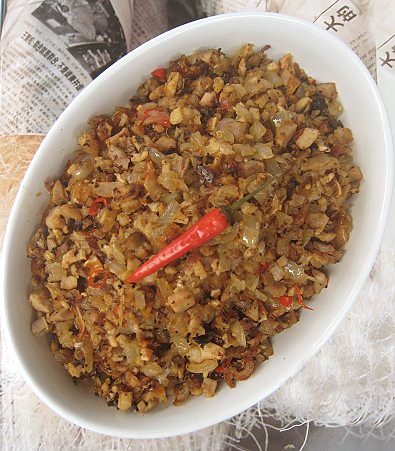
JS:
Unfortunately (again), the leftover pig's head meat we had did not really have enough crispy skin to provide some crunch to the dish. We did not have chicharon on hand at the time -- BUT!
Do as I say and not as I do:
Add CHICHARON ("chicharrón" in Spanish) or PORK RINDS as a topping for sisig. Just do it.
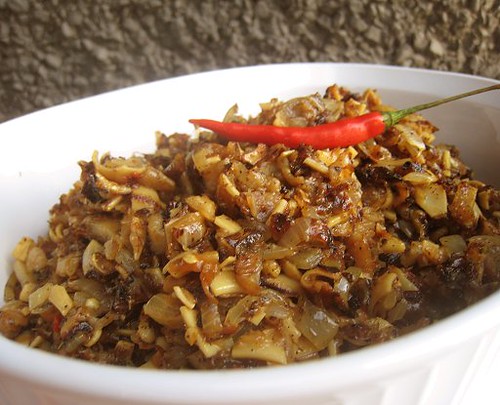
JS:
Depending on your tolerance, you can make sisig with a variety of pig parts.
To make the dish palatable to more mainstream palates, for instance, you can use non-offally pig parts, such as pork belly or heck, even pork shoulder.
However, the essential ingredient, in my humble opinion, is pig's ears. It just has that crunchy-elastic texture that no other pig part has, plus that unmistakable pigfunk-y goodness.
TS:
Do take a look at the Kulinarya recipe below, and do it right! ;) The recipe also has suggested substitutes for pork.
More eatingclub Philippine/Filipino food
Wikipedia: Sisig
Other Sisigs:
Burnt Lumpia: Spicy Sizzling Sisig
Market Manila: Sizzling Sisig
Market Manila: Lechon Sisig a la Marketman
Market Manila: Lechon Sisig on a Charcoal Grill
Enjoyed this post? Why not subscribe to our blog? Subscribe via reader or subscribe via email. Thank you! |
Recipe
 Sisig (Thrice-cooked Pork)
Sisig (Thrice-cooked Pork)from Kulinarya: A Guidebook to Philippine Cuisine
Serves 6
1 kg deboned pig's head (jowls, cheek, and ears)
2 pcs / 340 g big-sized white onions
8 cups / 2 liters water
2 cups / 500 ml pineapple juice
1 Tbsp / 15 g salt
1 Tbsp / 10 g whole black peppercorns
4 pcs chicken liver
2 Tbsp calamansi or lemon juice
1/4 cup / 60 ml white vinegar (sukang puti)
salt and pepper to taste
bird's eye chilies (siling labuyo) to taste
Preparation
1 Carefully pass the deboned pig's head over an open flame to remove visible bristles. Wash and cut into 4 pieces.
2 Peel and chop onions finely.
Cooking
1 In a stockpot, place water, pineapple juice, salt, peppercorns, chicken liver and pig's head pieces. Cover stockpot and bring to a boil, then immediately reduce to simmer. Continue to cook until meat is fork tender but not too tender, so the ear cartilage is still on the crunchy side, about 45 minutes to an hour.
2 Remove pork and chicken livers from stockpot and cool to room temperature. Discard the liquid.
3 Grill the pork over charcoal until the skin becomes brown and crisp.
4 Chop the pork and chicken livers into small cubes. Place in a bowl.
5 Mix in the calamansi or lemon juice, chopped onions, white vinegar, salt, pepper and the chilies.
6 Just before serving, heat a skillet to sizzling hot. Put the meat mixture in. This is the third cooking stage where the meat becomes browned a bit and gets an added crunch.
Serving Suggestion
Sisig is served on a hot sizzling skillet with halved calamansi and chopped chilies on the side.
Substitutes
lechon kawali/pork belly
chicken
tuna
milkfish
tofu
I've been following your blog for a while now, never quite got the courage up to comment though. However, I -have- to say that sisig looks fascinating. I'm not sure I'll be able to make it any time soon because getting hold of a whole, roasted pig's head is a bit difficult for me (and I'm a single girl, I don't know what I'd do with all the leftovers!) I aim to try during Chinese New Year though, when there's a very good chance of lots of people to eat along with me, and I go home to visit my parents - there is a stall near my house that makes the BEST roast pork ever and I'm sure I can beg one or half a pig's head from the wonderful lady in charge.
ReplyDeleteThat said, I am about to make Chairman Mao's Red Braised Pork again - because it was -great- the first time I tried it three weeks ago! This time I'm going to add tofu cubes to the braise, and reconstituted shitake mushrooms. I might make the sauce a little more savoury to match the mushrooms, but I will let you know how that turns out! Wonderful recipe, thank you so much!
--Shuku
http://glutenfreechaboh.blogspot.com
One of my favorite dishes TS..... here in San Diego, the majority of places make it with Lechon Kawale.
ReplyDeleteMay I say that i LOVE sisig? Even I can't really see what's in there when I ate it. Always in a bar / club with Pinoy's band blazing in the background. I have had no idea what's in there. Yours looks delicious!
ReplyDeleteIt's not completed without the crunch! so truee..
ReplyDeleteShuku:
ReplyDeleteNice to hear from you! =)
sisig: Some people do use just pork belly or pork shoulder if the head is hard to come b. =)
mao's braised pork: Thanks for trying out the dish and letting us know!
KirkK:
Ah. I guess that is good, too, hehe. I actually am not *too* fond of any overly ear-y flavor.
Jun @ Indochine Kitchen:
It's just various pork cuts. Nothing disturbing. ;) Thanks!
Mimimoza:
Yeah. Next time we'll just buy a bag of chicharon and dump it onto the dish. =D
I was just talking about sisig on twitter and how much I missed it and then stumbled upon THIS post. Nothing is as frustrating as staring at gorgeous Philippine food and not being able to have it! This is just making me hungry.
ReplyDeleteKulinarya is such a great book - so happy I found the softcover version when I was in PH last year. Have you guys read "Memories Of A Philippine Kitchen?" http://amzn.to/grwaaD Probably my fav Pinoy cookbook next to the Adobo Cookbook
ReplyDeleteTrissa:
ReplyDeleteMade you hungry? Then our work is done! ;D
slif:
We haven't actually cooked much from it. Too lazy. =) We borrowed _Memories of a Phil Kitchen_ from our cousins a while back. Good read, but hard to cook from (because of the format of the cookbook).
Oh, adobo cookbook! Sounds intriguing.
Very glad that you were honest about having struggled with it the first time, and even happier that you decided to make it a second time. I'm sure there aren't many folk out there who would a) try to make sizzling pig face once let alone b) remain undeterred and try it again! We made orejas a la plancha a year or so ago and never posted it because the ears were either too crunchy or gloopy and snotty, and we, too, came to the conclusion that the other parts from the pig's face are preferable. And, congratulations on the addition of chicharron! It's my opinion that everything can be improved by chicharon, with the possible exception of cardiac health...
ReplyDelete